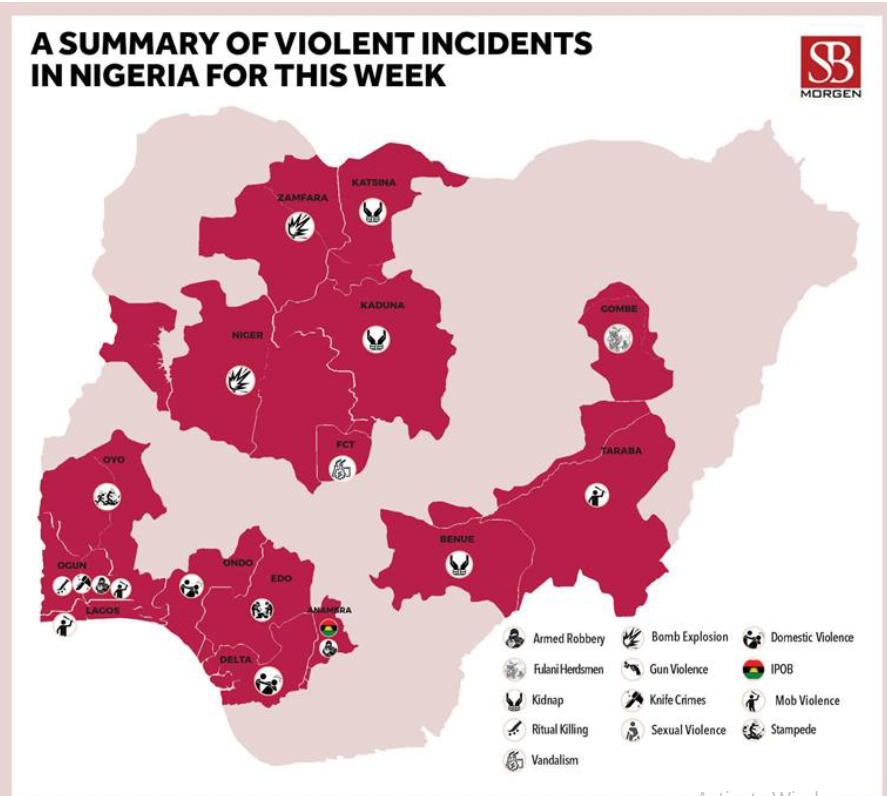As the holiday season approaches, the joyous anticipation of Christmas is overshadowed by a series of grave security challenges across Nigeria and its neighbouring regions. From infrastructural sabotage to violent conflicts and economic sabotage, these issues not only disrupt the daily lives of citizens but also strain national stability. This SBM Intelligence article examines the critical issues plaguing the region, highlights their root causes, and proposes actionable solutions.
The Cost of Infrastructure Sabotage
One of Nigeria’s persistent problems is the destruction of critical public infrastructure. Since January 2022, over 117 electricity towers have been vandalised nationwide, with each costing about ₦110 million to repair. For instance, the targeted attack on the 330kV Shiroro-Kaduna power line plunged Kano and Kaduna into a two-week blackout, causing economic losses exceeding ₦1.5 trillion. This decline in productivity underscores the urgent need to protect essential services. To counter such sabotage:
- Strengthen Security Measures: Deploy advanced surveillance systems, drone technology, and rapid response units to safeguard critical infrastructure.
- Engage Communities: Empower civilians to report suspicious activities and provide whistleblower protections.
- Policy Enhancements: Introduce harsher penalties for vandals and incentivise community protection initiatives.
Explosive Threats in Conflict Zones
The increasing use of improvised explosive devices (IEDs) by extremist groups like Boko Haram is alarming. Areas like Shiroro, with accessible mining explosives, have become hotspots for such activities. Between 2010 and mid-2022, over 1,600 IED attacks in West Africa resulted in thousands of deaths and injuries.

Solutions:
- Control Supply Chains: Regulate the distribution of explosive components and strengthen oversight of mining activities.
- Expand Arms Recovery Programs: Broaden the scope to include explosives alongside firearms.
- Enhance Intelligence Gathering: Invest in technologies and partnerships that enable preemptive action against potential attacks.
Farmer-Herder Conflicts: A Persistent Threat
In Gombe State’s Billiri Local Government Area, suspected herders killed five people and burned over 250 houses in a recent attack. Such clashes, fueled by competition over land and resources, have claimed thousands of lives. Despite two years of relative peace, the resurgence of violence reflects deeply rooted tensions.
Recommendations:
- Conflict Resolution Platforms: Establish neutral forums for dialogue between farmers and herders.
- Land Management Policies: Enforce equitable land use and provide alternative livelihoods for herders.
- Community Policing: Strengthen local security mechanisms to deter violence.
Domestic Violence and Mental Health Crises
The tragic case of Ms. Blessing Ibuku, who killed her 10-month-old baby after facing societal mockery, highlights the intersection of economic hardship, domestic violence, and mental health. Such incidents underline the need for public sensitisation and support systems.
Addressing the Issue:
- Expand Mental Health Services: Make mental health care accessible and affordable in underserved areas.
- Public Awareness Campaigns: Educate citizens on recognising and addressing domestic violence.
- Strengthen Legal Frameworks: Implement stricter laws against domestic violence and provide shelters for victims.
Kidnappings and Cult-Related Violence
The festive season has seen a surge in kidnappings and cult violence. In Anambra State, for instance, gunmen abducted several individuals while cult clashes in Edo State claimed multiple lives. These crimes often stem from economic desperation and weak law enforcement.
Combatting Crime:
- Empower Rural Vigilantes: Equip and train local security groups to fill gaps in formal policing.
- Economic Empowerment Programs: Address unemployment to reduce the allure of crime.
- Data-Driven Policing: Use crime data to deploy resources effectively.
Mass Casualty Events and Poor Planning
The recent stampede in Oyo State, which claimed the lives of 35 children during a Christmas event, underscores Nigeria’s chronic failure in crowd control and event management.
Preventative Measures:
- Strict Event Regulations: Enforce government guidelines for public gatherings.
- Emergency Preparedness Training: Equip event organisers and security personnel to manage crowds effectively.
- Accountability Mechanisms: Hold organisers responsible for lapses in safety protocols.
Conclusion
The multi-faceted security crises across Nigeria and West Africa demand coordinated, innovative, and inclusive solutions. By addressing the root causes of violence, enhancing law enforcement, and fostering community engagement, governments can restore stability and ensure a safer, brighter future for their citizens. As we reflect on these challenges, the festive season serves as a stark reminder of the need for resilience, unity, and action in the face of adversity.


